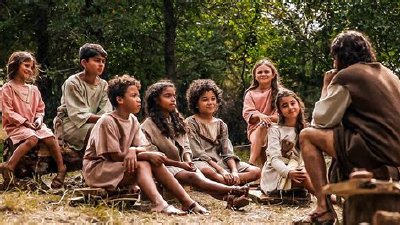


April 4-8, 2022
Reflections from Matthew 19


Jesus Loves the Little Children
April 7, 2022 • Ed Green • Matthew 19:13–15
Jesus’ disciples seemed to think they were his “handlers.” Maybe they thought they were protecting him, or keeping him on task, or acting as his agents, deciding who had access to him. In Matthew 19, some folks were wanting to bring their children to Jesus, perhaps so he could lay hands on them and bless them. But in the culture of the day, children weren’t worth a whole lot—at least until they could work as part of the family. They occupied a pretty low rung on the social ladder; hence in the disciples’ minds, they didn’t deserve Jesus’ attention. But they should have known better; Jesus had already addressed this earlier, in chapter 18. He had used a child as an illustration of what it meant to be great in God’s kingdom. One of my favorite episodes of The Chosen, the TV show about Jesus and his disciples, is entitled “Jesus Loves the Little Children.” Jesus befriends and teaches a group of children who discover His camp on the outskirts of Capernaum. This last weekend our church held a child dedication event. While some church traditions baptize children, ours does not. However, we do offer an opportunity for parents to dedicate their children in gratitude to the Lord, and themselves to raise them in the training and instruction of the Lord (Ephesians 6:4). Children are a blessing from the Lord, not only to the parents but to all of us. We’ve all heard the African proverb, “it takes a village to raise a child.” That is also true within the church. As God’s people we are called to love, support, and encourage parents in their responsibility to raise their children to know and love the Lord. That encouragement may take many different forms, but it is not optional. What might that look like for you?


You Can't Be Serious!
April 6, 2022 • Ed Green • Matthew 19:10–12
"Why are you still single?" "Are you dating anyone yet?" "That biological clock is ticking!" "You're too pretty to be single!" "When are you going to get married?" "Anyone would be lucky to have you." "You can't be too picky!" Have you ever heard any of these?... Or said them? I think sometimes we unintentionally communicate to single people in the church that they are second-class Christians. Think about it. When we talk about “the family” in our church, do we intentionally include singles in that? Or do we think about a more traditional family: married with 2.5 kids? Do our sermons address the needs of single people as well as those who are married? Do singles feel “invisible” in our church? As Jesus’ disciples listened to him talk about his view of how few reasons should end a marriage, they couldn’t believe their ears: “If such is the case of a man with his wife, it is better not to marry” (Matthew 19:10). Jesus essentially responded, “that may indeed be the case, but not everyone is called to that.” Jesus here, and Paul later (1 Corinthians 7:6-9), affirms that there is value in remaining single. But do we really believe that? Do our words and our actions bear that out? Statistics tell us that more and more people are delaying getting married. While there are many reasons for this, single (and single again) adults are a growing population in our culture and the church that we largely ignore. Instead, let’s remember that these individuals are men and women created in God’s image, in need of his grace and salvation, and full of potential for impacting the world for Christ. Let’s love them, welcome them, disciple them, and invite them to be full members with all of us as God’s people on his mission in the world.


The Camel and the Needle
April 8, 2022 • Ed Green • Matthew 19:16–26
We don’t know for sure, but some attribute this saying to Mark Twain: “It ain't those parts of the Bible that I can't understand that bother me, it is the parts that I do understand.” What do you think? One of those hard sayings we find in the Bible come from Jesus’ own lips: “Truly I tell you, it is hard for someone who is rich to enter the kingdom of heaven. Again I tell you, it is easier for a camel to go through the eye of a needle than for someone who is rich to enter the kingdom of God” (Matthew 19:23-24). It's straightforward. No big words or deep theological truths. But wow! is it hard to hear. We think that it surely doesn’t apply to us because we are obviously not rich. But aren’t we? Why would Jesus say such a thing? A traditional explanation has been that there was this small gate into Jerusalem called the “eye of the needle” and that camels would have to get down and essentially crawl through the gate. This would suggest that it is very difficult. The problem is, there was never such a gate, and Jesus doesn’t say it is difficult; he implies it is impossible. And he is using hyperbole to get that point across: a figurative camel through an eye of a needle! That not only bites against the grain for us, but it did for the disciples when they first heard it. In their culture wealth was believed to be a sign of blessing from God, but Jesus turns that on its head, and says that wealth is actually a barrier to entering the kingdom. Matthew tells us that the disciples were astonished and asked, “Who, then can be saved?” (19:25). Jesus rocked their world, and none of them were even rich! Ah, but then we hear his words for ourselves. And most of us look at our own homes, in our garages, our 401k’s, and all our toys, and we have to admit that we are, indeed, rich. How does our own relative wealth get in the way? That’s your assignment for today, to reflect on that question. Don’t worry, though. God specializes in the impossible (19:26)!


The Trauma of Divorce
April 5, 2022 • Ed Green • Matthew 19:1–8
There is a meme that has been making the rounds recently on TikTok and Instagram. It is of comedian Steven He (from a sketch on the difficulties of being Asian), yelling “Emotional damage!” I doubt if there are many families that have not been impacted by divorce. In my own family, I am told that before my mom became pregnant with yours truly, she was planning on getting a divorce from my father. While both my wife Sally and I have parents and grandparents that have not divorced, we have aunts, uncles, siblings, and cousins that have been. So, while I have not experienced it firsthand, I have witnessed its tragic effects. In his discussion on divorce in Matthew 19, Jesus says this: “What therefore God has joined together, let not man separate” (19:6). We have seen in our reflection yesterday, that Jesus affirmed God’s good intention for marriage by emphasizing how few things should break it apart. God’s ideal is marriage for life. But because of our own selfishness and pride, and sinfulness, divorce was permitted in Scripture. It is a reality in our culture today, with statistics suggesting that up to half of new marriages will end in divorce. That’s a lot of people—adults and children—impacted by the breaking of a marriage. Could it be that God, whose idea marriage was, knows best what can happen when it falls apart? What hurt it can cause to the wife and the husband and the kids? Is there any reason to think that God did not have our best interest in mind as Jesus says, What God has joined, let no one tear it apart? He knows and he understands what emotional damage can happen because of broken families. Even though divorce is not his desire, in his grace he can bring comfort and healing. It may not be easy or quick, but we can trust that his grace is sufficient. The question for each of us then is, how can I be a channel for that compassion and grace in someone’s life? And if you have been divorced, how can I receive God's grace and forgive both my former spouse and myself?


A Sticky Wicket
April 4, 2022 • Ed Green • Matthew 19:1–8
Have you ever heard the phrase, “that’s a bit of a sticky wicket?” I was never sure what a “wicket” was—the only thing I know by that name is the wire hoop you hit the ball through in croquet (which I played a lot growing up). Apparently, it is a term used in the game of cricket and describes when the pitch (the playing area) gets damp and soft. Consequently, the ball can bounce unpredictably. Hence, the phrase “sticky wicket” has come to mean an embarrassing or difficult situation. If you would have been listening in, some Pharisees came to Jesus and asked him a particularly sticky question: “Is it lawful to divorce one's wife for any cause?” (Matthew 19:3). They had hoped to trap him. In Jesus’ day, there were two dominant schools of thought, based primarily on Deuteronomy 24:1. Hillel, one the leading rabbis of the day believed that divorce could be allowed for adultery and almost any other cause. Rabbi Shammai, another respected rabbi, held a much more restricted view, that divorce was allowed only for adultery (sexual sin breaking the marriage covenant, designated by the Greek work “porneia”). Jesus took a stand that affirmed God’s high intention for marriage, essentially siding with the stricter view of Shammai. But that was not the more popular view among the people. Jesus goes on to quote from Genesis 1 and 2, from the very beginning of the Torah. God created man and woman both in his image, and how, in marriage, they become one flesh. In our culture (and—to our shame—in the Church), divorce was almost treated like an unforgiveable sin. Those who divorced were ostracized and considered to be second-class citizens. But these days, the pendulum has swung to the other extreme. Almost like it had in Jesus’ day. What would it look like for us to strive for the kind of truth (Matthew 19) and grace (John 4) that Jesus exhibited in our world today, when we talk about marriage and divorce?
